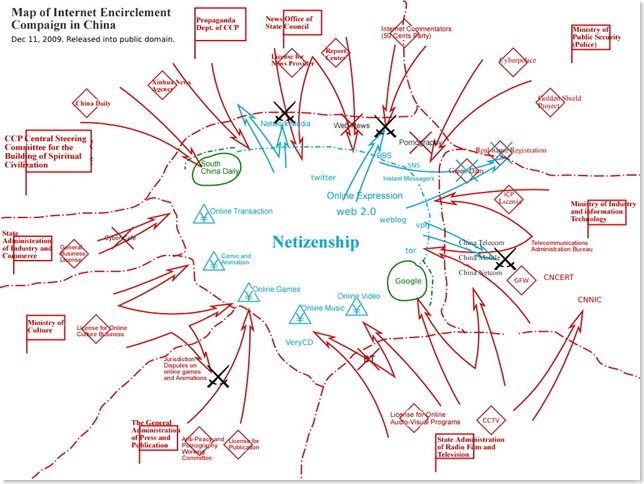The Splitting Internet Governance and the Down-to-Earth Solutions
Here is a very brief explanation to and my viewpoint of the latest development of China’s compaign to the Internet Controlling. Like my other ideas, this one might not be mature enough. But anyway, the reason of saying something is to get the commentaries and/or criticisms.
1. The definition of the Splitting Internet Governance: it has multiple meanings
(1) The separation of the Internet under the governance of ICCAN (at least namely) and the “Cinternet” under the the governance of the China’s government;
(2) the departed jurisdication of the Internet Governance in China.
2. The history of China’s Internet Controlling: My own division of periods
Regulation/legislation regardless the techonology neutrality (1996-2003)
–> Technology Control but very low frequency to enforce the regulations (2003-2005)
–> Begin to rely on the law enforcement but the technology control is still the main stream (2003-2009)
–> Using the law, and put the technology filtering mechanisms the second place (2009)
3. Pros and Cons of the above Transform in 2009
Pros: It finally go back to the track of lawyering.
Compare:
2007: No one know who ordered to shut down the website, and sometime no one know the reason.
2008: At least one knows who ordered to shut down the website.
2009: The reason of shut down is explained, and the subject is clearer and clearer
Cons:
(1) The old law (regulation was promulgated in 1990s, and the provisions are not compatible to the ) and the older approach by itself are arbitrary and immature, the enforcement may cause the officals find the benifit of the selective enforcement.
(2) The law may not compatible to the other parts of the “Internet”. The conflicts may be everywhere. The “dark net” may be highly developed.
4. the Down-to-Earth Solutions
… forthcoming…


 Comments(1)
Comments(1)